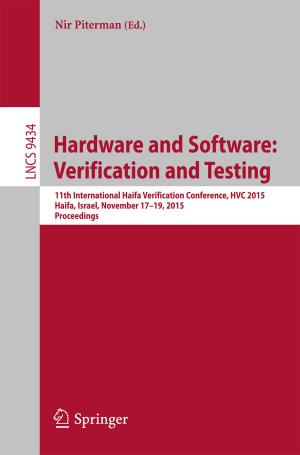Life Cycle Assessment
Theory and Practice
Nonfiction, Science & Nature, Technology, Manufacturing, Science, Biological Sciences, Environmental Science| Author: | ISBN: | 9783319564753 | |
| Publisher: | Springer International Publishing | Publication: | September 1, 2017 |
| Imprint: | Springer | Language: | English |
| Author: | |
| ISBN: | 9783319564753 |
| Publisher: | Springer International Publishing |
| Publication: | September 1, 2017 |
| Imprint: | Springer |
| Language: | English |
This book is a uniquely pedagogical while still comprehensive state-of-the-art description of LCA-methodology and its broad range of applications. The five parts of the book conveniently provide: I) the history and context of Life Cycle Assessment (LCA) with its central role as quantitative and scientifically-based tool supporting society’s transitioning towards a sustainable economy; II) all there is to know about LCA methodology illustrated by a red-thread example which evolves as the reader advances; III) a wealth of information on a broad range of LCA applications with dedicated chapters on policy development, prospective LCA, life cycle management, waste, energy, construction and building, nanotechnology, agrifood, transport, and LCA-related concepts such as footprinting, ecolabelling,design for environment, and cradle to cradle. IV) A cookbook giving the reader recipes for all the concrete actions needed to perform an LCA. V) An appendix with an LCA report template, a full example LCA report serving as inspiration for students who write their first LCA report, and a more detailed overview of existing LCIA methods and their similarities and differences.
This book is a uniquely pedagogical while still comprehensive state-of-the-art description of LCA-methodology and its broad range of applications. The five parts of the book conveniently provide: I) the history and context of Life Cycle Assessment (LCA) with its central role as quantitative and scientifically-based tool supporting society’s transitioning towards a sustainable economy; II) all there is to know about LCA methodology illustrated by a red-thread example which evolves as the reader advances; III) a wealth of information on a broad range of LCA applications with dedicated chapters on policy development, prospective LCA, life cycle management, waste, energy, construction and building, nanotechnology, agrifood, transport, and LCA-related concepts such as footprinting, ecolabelling,design for environment, and cradle to cradle. IV) A cookbook giving the reader recipes for all the concrete actions needed to perform an LCA. V) An appendix with an LCA report template, a full example LCA report serving as inspiration for students who write their first LCA report, and a more detailed overview of existing LCIA methods and their similarities and differences.















